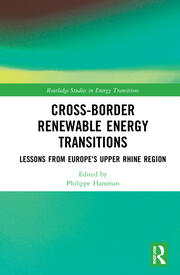Book Description
This book explores the intrinsically multiscale issue of renewable energy transition from a local, national and transnational perspective, and provides insights into current developments in the Upper Rhine Region that can serve as an international model.
Organised around the exploration of stakeholder issues, the volume first describes a framework for public action and modelling and then articulates a triple complementary focus from the viewpoint of law, economics and sociology. This multidisciplinary approach is anchored in the social sciences, but also explores the ways in which technological issues are increasingly debated in the implementation of the ecological transition. With a focus on the Upper Rhine Region of France, Germany and Switzerland, the contributions throughout analyse how concrete regional projects emerge, and whether they are carried out by local authorities, private energy groups, network associations or committed citizens. From this, it appears that real-world energy transition modes can be best understood as permanent transactional processes involving institutional regulations, economic levers and barriers and social interactions.
This book will be of interest to advanced students and scholars focusing on renewable energy transition, stakeholder issues, environment and sustainability studies, as well as those who are interested in the methodological aspects of the social sciences, especially within the fields of sociology, law, economy, geography, political science, urbanism and planning.
Table of Contents
List of figures, maps, boxes
List of contributors
Preface and acknowledgements
Part I: From conceptual framework to regional prospective modelling
Chapter 1. Renewable energy transition beyond borders in Europe: From a literature review to a case study in the Upper Rhine Region
Philippe Hamman
Chapter 2. A regional cross-border approach to the energy transition: Political context and decarbonisation pathways, renewable energy potentials, and two energy system models
Ines Gavrilut, Felix Kytzia, Kristina Izmailova, Zeina Najjar, Barbara Koch, Marco Andrés Guevara-Luna, Adrien Barth, Alain Clappier, Nadège Blond, Johannes Miocic, Joris Dehler-Holland, and Bushra Canaan
Part II: Regulatory frameworks and cross-border cooperation issues
Chapter 3. Franco-German cross-border cooperation on hydropower implementation: Regulatory issues and future challenges
Melis Aras and Vincent Dubarle
Chapter 4. Franco-German partnerships for the production of photovoltaic energy: The difficulties of a cross-border cooperation for renewable energies
Élisabeth Lambert and Laurie Nogues
Chapter 5. Deep geothermal energy versus transboundary environmental protection: The law as a conciliation tool?
Lou-Anne Bedaride and Sophie Gambardella
Part III: Economic barriers, opportunities and incentives
Chapter 6. Chances and barriers to European transnational collaboration in the development of a sustainable energy market: Potentials in the Upper Rhine Region
Nora Auguste Möller, Maximilian Hansmann, Dominik Schröder, Bianca Blum, and Bernhard Neumärker
Chapter 7. The political economy of a transnational and sustainable electricity market: The expansion of the Trinational Metropolitan Region Upper Rhine (TMO)
Viola Nellessen, Dominik Schröder, Bianca Blum, and Bernhard Neumärker
Part IV: Sociological interplays: key actors and citizen participation
Chapter 8. Renewable energies in the Upper Rhine Region from a stakeholder viewpoint: Projects, territorialisation and networks in the making
Marie Mangold and Philippe Hamman
Chapter 9. Citizen energy cooperatives in the Upper Rhine Region: Commoning issues in the transition towards a decarbonised and decentralised future
Philippe Hamman
Conclusions
Philippe Hamman
Index



